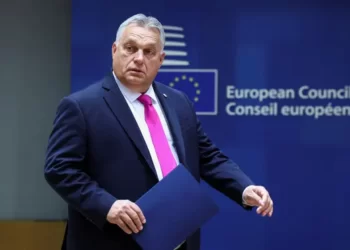Kremlin spokesman, Dmitry Peskov has raised the alarm of a potentially “catastrophic” provocation by the Ukrainian army at the Zaporizhzhia Nuclear Power Plant.
In response to a reporter’s question about the plant, Peskov remarked, “The situation is quite tense. There is a great threat of sabotage by the Kyiv regime, which can be catastrophic in its consequences.”
Peskov added that the Kremlin was pursuing “all measures” to foil the alleged Ukrainian threat.
This comes after Ukraine accused Russia of planning to attack the nuclear plant.
While referring to the latest intelligence reports, Ukrainian President Volodymyr Zelenskyy alleged on Tuesday, July 4, 2023 night that Russian troops had placed “objects resembling explosives” on top of several of the plant’s power units to “simulate” an attack from outside.
However, neither Russia nor Ukraine provided evidence to support their claims of an imminent threat to the facility in southeastern Ukraine that is occupied by Russian troops.
The Zaporizhzhia nuclear power plant has been a focus of fear since Moscow’s forces took control of it and its staff in the early stages of the war. Ever since then, Moscow and Kyiv have traded blame for shelling the facility and accused each other of nuclear terrorism.
Regular power outages resulting from shelling made it impossible to operate the plant safely, and its six reactors have been shut down to minimize the threat of a disaster.
The International Atomic Energy Agency (IAEA) Director General, Rafael Mariano Grossi said that his agency’s most recent inspection of the plant found no activity related to explosives, “but we remain extremely alert.”
“As you know, there is a lot of combat. I have been there a few weeks ago, and there is contact there very close to the plant, so we cannot relax,” Grossi said during a visit to Japan.
The IAEA has officials stationed at the Russian-held plant, which is still run by a Ukrainian staff that oversees crucial cooling systems and other safety features.
The facility’s location in an area of intense fighting has made it vulnerable to stray missiles. The IAEA has made attempts to forge a deal on a security zone around the plant but they proved futile.
Nuclear Power Plant Not Fit To Be Used As A Military Base

Also, Grossi asserted that he was aware of both Kyiv’s and Moscow’s claims and reiterated that “nuclear power plants should never, under any circumstances, be attacked.”
“A nuclear power plant should not be used as a military base,” he said.
Ukrainian officials have said the shut-down reactors are protected by thick concrete containment domes, and experts have said that the plant’s design allows it to withstand barrages.
However, the nuclear waste storage facility at the plant could be more vulnerable.
Meanwhile, according to the International Institute for Strategic Studies, a Russian attack on the Zaporizhzhia plant would “probably not lead to the widespread dispersal of significant amounts of radiation” due to precautionary steps taken by the IAEA.
In a recent study, the institute noted that “A blast at Zaporizhzhia would spread radiation and sow panic, but the actual off-site radiation risk would be relatively low,’’ adding that wind might blow some radiation toward Russia.
The most likely scenarios are a Russian-engineered explosion that exposes one of the reactor cores and starts a fire that burns spent fuel, or a blast involving the dry spent fuel on site that would carry the radiation far afield via wind, the IISS said
READ ALSO: We Hope Adjournment Of Gyakye Quayson’s Trial Does Not Become A Norm- Deputy AG























